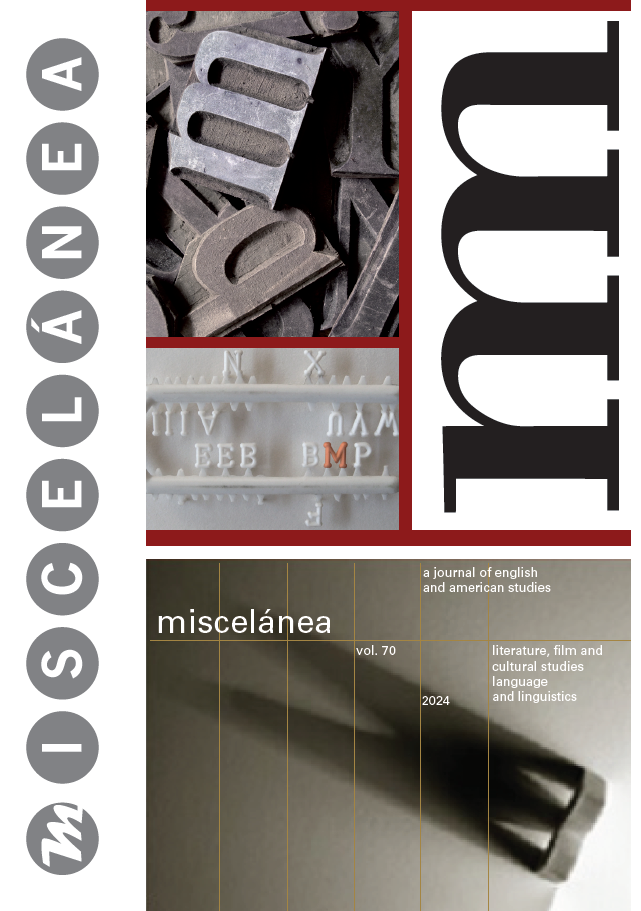Static and Kinetic Utopianism in Octavia Butler’s Parable of the Sower
DOI:
https://doi.org/10.26754/ojs_misc/mj.202410023Keywords:
utopianism, utopia, dystopia, Parable of the Sower, EarthseedAbstract
Dystopian worlds are filled with inequalities, oppression and authoritarian regimes. They are cautionary tales that warn about potential dangers. And yet, it is also possible to find positive attitudes and insubordinate characters who fight back through the utopian wish, such as the case of Lauren Olamina. This utopianism yearns for better worlds, free of injustices. This paper focuses on Octavia Butler’s
Parable of the Sower (1993) and the confrontation of two utopianisms, static and kinetic, through religion. Kinetic utopianism, represented by Lauren and Earthseed, advocates for change and adaptability. In contrast, static utopianism, represented by Lauren’s father and the Baptist religion, focuses on traditional values, and shows reticence towards change. This novel does not intend to condemn any belief system, but to explore the impact that these two utopianisms have on a particular society. The article concludes that the kinetic utopianism of Lauren and Earthseed makes possible the change that she wants in the world through adaptability and progress. On the other hand, the refusal of change and adaptation that characterises static utopianism ultimately leads to its own
disappearance.
Downloads
References
BACCOLINI, Raffaella. 2004. “The Persistence of Hope in Dystopian Science Fiction”. The Modern Language Association of America 119 (3): 518-521. <https://doi.org/10.1632/003081204X20587>.
BERLIN, Isaiah. 2013. The Crooked Timber of Humanity: Chapters in the History of Ideas. Princeton: Princeton U.P.
BUTLER, Octavia E. (1993) 2019. Parable of the Sower. London: Headline.
CHOUDHURY, Antara and Shreyashi MUKHERJEE. 2023. “Religion and Critical Dystopia: Afrofuturism in Octavia E. Butler’s Parable of the Sower”. IIS University Journal of Arts 12 (3-4): 1-14.
CLAEYS, Gregory. (ed.) 2010. The Cambridge Companion to Utopian Literature. Cambridge: Cambridge U.P.
CLAEYS, Gregory. 2010. “The Origins of Dystopia: Wells, Huxley and Orwell”. In Claeys, Gregory (ed.): 107-134.
DERY, Mark. 2008. “Black to the Future”. In Barr, Marleen S. (ed.) Afro-Future Females: Black Writer’s Chart Science Fiction’s Newest New-Wave Trajectory. Ohio: the Ohio State U.P.: 6-13.
DUTTON, Jacqueline. 2010. “‘Non-western’ Utopian Traditions”. In Claeys, Gregory (ed.): 223-258.
HINTON, Anna. 2018. “Making Do with What You Don’t Have: Disabled Black Motherhood in Octavia E. Butler’s Parable of the Sower and Parable of the Talents”. Journal of Literary and Cultural Disability Studies 12 (4): 441-457. .
JAMESON, Frederic. 2005. Archaeologies of the Future. The Desire Called Utopia and Other Science Fictions. London: Verso.
MILLER, Jim. 1998. “Post-Apocalyptic Hoping: Octavia Butler’s Dystopian/Utopian Vision”. Science Fiction Studies 25 (2): 336-360.
NILGES, Mathias. 2009. “‘We Need the Stars’: Change, Community, and the Absent Father in Octavia Butler’s ‘Parable of the Sower’ and ‘Parable of the Talents’”. Callaloo 32 (4): 1332-1352. <https://www.jstor.org/stable/27743152>.
POPPER, Karl. (1945) 1947. The Open Society and its Enemies. Volume One: The Spell of Plato. Princeton: Princeton U.P.
RUFFIN, Kimberly T. 2005. “Parable of a 21st Century Religion: Octavia Butler’s Afrofuturistic Bridge between Science and Religion”. Obsidian III 6/7: 87-104. <http://www.jstor.org/stable/44511664>.
STILLMAN, Peter G. 2003. “Dystopian Critiques, Utopian Possibilities, and Human Purposes in Octavia Butler’s Parables”. Utopian Studies 14 (1): 15-35. .
VIEIRA, Fatima. 2010. The Concept of Utopia. In Claeys, Gregory (ed.): 3-27.
WANZO, Rebecca. 2005. “Apocalyptic Empathy: A ‘Parable’ of Postmodern Sentimentality”. Obsidian III 6/7: 72-86. <https://www.jstor.org/stable/44511663>.
WELLS, H. G. (1905) 2009. A Modern Utopia. London: Penguin.
WOMACK, Ytasha. 2013. Afrofuturism: The World of Black Sci-fi and Fantasy. Chicago: Independent Publishers Group.
Published
How to Cite
Issue
Section
License
Copyright (c) 2024 Lucía Ramírez García

This work is licensed under a Creative Commons Attribution-NonCommercial 4.0 International License.
Accepted 2024-07-04
Published 2024-12-16


